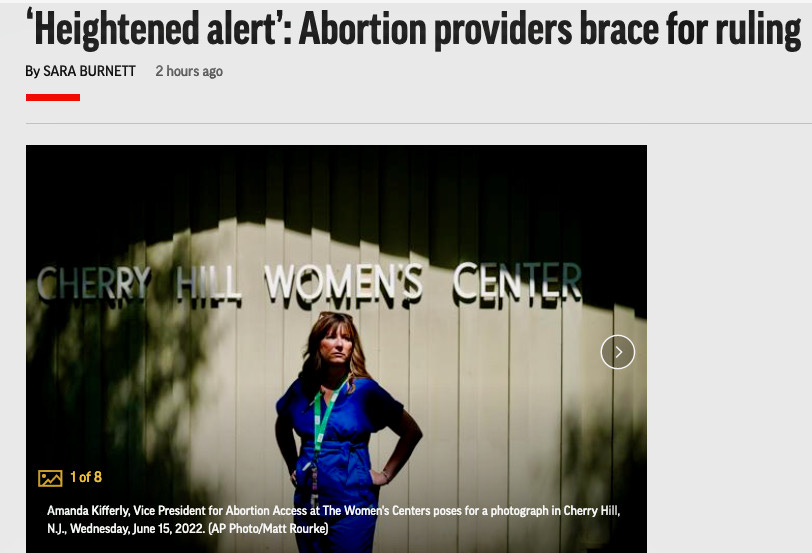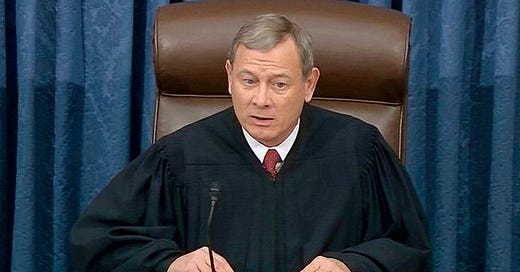Supreme Court’s abortion ruling risks lasting damage to its credibility
A large majority favors keeping 50-year-old Roe precedent
The Supreme Court’s historic abortion decision should come as no surprise to anyone since it was previewed by an unprecedented leak weeks ago.
But in tossing out five decades of established precedent in Roe v Wade, the top court may have self-inflicted serious damage to its credibility as an impartial arbiter of what’s constitutional.
The most reliable public opinion polls show a large, consistent majority favors reproductive rights. Some recent polls have already shown a dramatic decline in public confidence in the Supreme Court.
Now, a significant number will see most of the justices as partisans in service of a political agenda out of step with the times.
But whether the court does or should take public opinion into account is an open question.
However, by ignoring such a clear public preference, the court risks further long-term erosion of its credibility. Evidence shows it’s a real possibility.

The broad outlines of the decision have been known and debated since early May when Politico published a leaked draft of it with the article Supreme Court has voted to overturn abortion rights, draft opinion shows.
The first-draft opinion was written earlier this year by one of the court’s most conservative members, Justice Samuel Alito, and circulated among a limited number of court insiders.
It was stunning.
“The draft opinion is a full-throated, unflinching repudiation of the 1973 [Roe v Wade] decision which guaranteed federal constitutional protections of abortion rights and a subsequent 1992 decision — Planned Parenthood v. Casey — that largely maintained the right,” Politico wrote in its summary.
The exact language in the draft may have have been subject to some minor revision in the final ruling. But the initial wording affords a valuable insight into the thinking of the justice whose name is forever fixed to the decision.
Only five pages into the document, we get to the core of the decision:
“We hold that Roe and Casey must be overruled. The constitution makes no reference to abortion and no such right is implicitly protected by any constitutional provision including the one on which the defenders of Roe and Casey now chiefly rely – the Due Process Clause of the 14th Amendment.
“That provision has been held to guarantee some rights that are not mentioned in the constitution but any such rights must be ‘deeply rooted in this nation's history and tradition’ and ‘implicit in the concept of ordered liberty.’
“The right to an abortion does not fall within this category.”
On Page 6, Justice Alito elaborated:
“Roe was egregiously wrong from the start. Its reasoning was exceptionally weak, and the decision has had damaging consequences. And far from bringing about a national settlement of the abortion issue, Roe and Casey have enflamed debate and deepened division.”
Indeed, if that last assertion is true and if it was Alito’s intent to heal the division and lower the temperature of the debate, his draft ruling had exactly the opposite effect.
Protests erupted across the country. Thousands have already taken to the streets to express their dismay; more protests are ongoing.
Furthermore, it amounted to a stinging rebuke of dozens of Alito’s predecessors on the country’s highest court who have over 50 years upheld to two rulings – and even more jurists at the appellate levels who have done the same.

The authority of the US Supreme Court rests in no small measure on the acceptance of its rulings by the American public. It does not have an army or a police department to force compliance.
That might be a compelling reason it should take special care on an issue as explosive as reproductive rights.
But reliably and accurately measuring public opinion on this issue is fraught with difficulty. It’s a complex and nuanced controversy, which many polls struggle to define and measure.
A great deal depends on how the question is framed, and answers often vary because pollsters ask essentially different questions.
A good place to start, however, is with one of the top polling outfits in the US, which has for over 30 years asked the same simple question.
In a poll conducted after the draft opinion was leaked but before the final ruling, the Gallup organization found that a Steady 58% of Americans Do Not Want Roe v. Wade Overturned.
“Americans remain largely opposed to overturning Roe v. Wade, as a steady 58% majority believe that the landmark 1973 Supreme Court ruling that recognized abortion as a constitutional right should stand, while 35% want it to be reversed. These sentiments are essentially unchanged since 2019,” Gallup reported.
Furthermore, the result was almost identical to when it first asked the question in 1989.
Note Gallup’s margin of almost two-to-one opposed to reversing Roe – a significant number that has been historically consistent.
“Dating back to 1989, support for reversing the decision has averaged 32%, while opposition has averaged 59%. The latest findings are from a May 2-22 Gallup poll, conducted almost entirely after a draft Supreme Court opinion that would overturn Roe v. Wade was leaked to the press,” Gallup reported.
In another poll conducted after the draft opinion was released, however, the reaction was fast and unambiguous. It was, however, asking a different question.
According to a poll conducted for Yahoo by YouGov the public regard for the top court changed dramatically after the draft opinion became widely known.
Yahoo summarized the findings in a May 10 article Poll: Confidence in Supreme Court has collapsed since conservatives took control.
The previous time such a poll was taken – in September 2020 – 70% of registered voters said they had either “some” (50%) or “a lot” (20%) of confidence in the court.
Only 30% said they had either “a little” (23%) or “none” (7%).
The new poll, however, showed that “Americans’ confidence in the U.S. Supreme Court has collapsed over the last 20 months,” Yahoo reported.
This period began with Senate Republicans confirming President Donald Trump’s third nominee, Justice Amy Coney Barrett, giving the court a 6-3 conservative majority.
“The new survey of 1,577 U.S. adults, which was conducted immediately after the leak, found that registered voters have swung from mostly having confidence in the Supreme Court — by a colossal 40-point margin — to being evenly split on the question,” the poll found.
“Today, just half of voters still express some (37%) or a lot (14%) of confidence in the court, while the other half now expresses either a little (24%) or none (26%).
“And among all Americans — as opposed to just registered voters — most (53%) now say they have either no confidence in the Supreme Court (28%) or only a little (25%). (emphasis added)
One other takeaway: the percentage answering “none” has skyrocketed from just 7% to to 28% – a four-fold increase!
We don’t know if this collapse in public support had any discernible effect on the deliberations of the Supreme Court because those are strictly private.
But they should have. The consequences of a court ruling that has a huge negative impact on public confidence in the court cannot be reliably measured in the short term but should be cause for concern.
To get a fuller picture of where the public stands on various dimensions of reproductive rights, we can find it in a Pew Research Center survey conducted in March, before the draft opinion was leaked: America’s Abortion Quandary found a great deal of nuance in public opinion.
“A majority of Americans say abortion should be legal in all or most cases, but many are open to restrictions; many opponents of legal abortion say it should be legal in some circumstances,” Pew reported.
“[R]elatively few Americans on either side of the debate take an absolutist view on the legality of abortion – either supporting or opposing it at all times, regardless of circumstances.”
Only 19% say it should be legal in all cases.
Less than half that number, 8% say it should be illegal in all cases.
This is noteworthy because the ultimate effect of the new ruling would be to completely ban all abortions in almost all cases in more than half the states. Only a tiny fraction of Americans support this position.
Also significant, in the Pew survey 71% either say abortion should be mostly legal or mostly illegal, or say there are exceptions to their blanket support for, or opposition to, legal abortion. The key word here is “mostly”; that’s the essence of nuance.
From this poll, it’s reasonable to conclude that an all-encompassing ruling that completely overturns Roe and allows states to ban all abortions is out of step with a large majority of Americans.

Even before the final ruling, after the massive outpouring of public protest that followed the leak of the draft opinion it came as no surprise the country has been anticipating the final decision with considerable anxiety.
This was confirmed in a June 23 Associated Press report ‘Heightened alert’: Abortion providers brace for ruling.
“[Abortion] providers and some in law enforcement worry what will come next,” AP reported. “They’re preparing for an increase in violence once the Supreme Court rules, saying there has historically been a spike when the issue of abortion gets widespread public attention, such as after a state approves new restrictions.
“If the decision ends Roe v. Wade [as it did] … they also anticipate protests, harassment and other violence to be more concentrated and intensify in states where abortion remains legal.”
Confidence should not be squandered
This is not a good omen. The same AP story highlighted another section of the draft opinion which gives us an additional clue to what the majority of the justices were thinking.
Alito, in the draft, said the court can’t predict how the public might react and shouldn’t try. “We cannot allow our decisions to be affected by any extraneous influences such as concern about the public’s reaction to our work,” Alito wrote in the draft opinion.
We are left to wonder if he or his colleagues in the majority even care that their authority derives from the will of the people.
To borrow a legal term they might understand, a prima facie case exists that they don’t give a hoot.
This is insensitive at best, dangerous at worst. Public faith in the nation’s highest court is a precious commodity which should not be squandered.
Today, it seems like the majority on the court just doesn’t care




I feel very sad for America. It is almost like it has slipped back a Century. Imagine if the same thing in relation to the racial laws.
Mostly I feel for the women who are caught in a difficult situation at this time.
It should be a woman's choice!
Warren, in class you speak about the NYTimes front page and how it reflects the most important news. If font size is any indicator, today’s headline of ROE OVERTURNED is important news. And the two photos of the winners and losers says it all. My only hope is that this terrible disappointment will last until November and that this energy will carry to produce a congress full of pro choice democrats. As to comments from the court that the constitution doesn’t cover abortion, it also doesn’t cover how many justices should be on the Supreme Court!